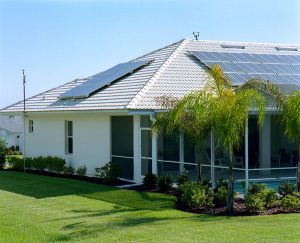American Dream megamall seeks first county approval
Posted by Admin on Jan 25, 2017 in American Dream, Carlos Gimenez, Fresh Colada, megamall, Miguel Diaz de la Portilla, News, special taxing districts | 0 commentsPlans for the Amerian Dream megamall — billed as the largest retail center/amusement park in the U.S. — will go before the 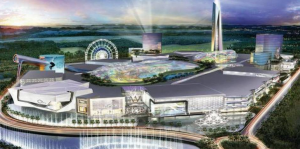 Miami-Dade County Commission for the first time Wednesday as they seek changes to the county land use and development master plan maps. And the two big topics will be traffic and tax breaks.
Miami-Dade County Commission for the first time Wednesday as they seek changes to the county land use and development master plan maps. And the two big topics will be traffic and tax breaks.
After all, we are talking about 3.5 million square feet of retail, a 350,000-square-foot amusement park, a 350,000-square-foot water park, a miniature golf course, an indoor ski slope, a lake with underwater submarine rides and water skiing, a 120,000-square-foot entertainment zone with restaurants and nightclubs, a youth sports center, one or more hotels providing 2,000 rooms and enough parking to accomodate all of that.
Traffic is the main concern plaguing both those who opppose the megamall and those who are in favor. There should be plenty of public speakers Wednesday as commissioners consider amending the Comprehensive Development Master Plan, the first step to allow for the mall’s construction.
“I would just hope the plan they show us has a robust transportation plan that allows people to get in and out relatively easily,” said Commission Chairman Esteban Bovo, who otherwise supports the mall because of the jobs it will create — Ladra has heard anywhere from 30,000 to 46,000, with 15,000 being permanent — and the $35 million or so in tax revenue that it is estimated to provide beginning the first year of operation, he said.
“Make no mistake, it’s going to have an impact,” Bovo said. “If what they submit to the board does not show a transportation plan that works for them and for us — and they know this — then this is not going to fly.”
A lot of folks also want promises that developer Triple Five Group 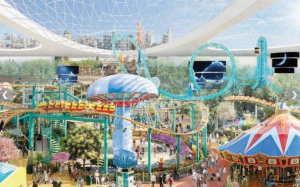 is not going to seek tax breaks either from the county or the state — not even through the creation of a special taxing district that would divert tax dollars from the county’s general fund and earmark them for infrastructure and traffic mitigation that the mall’s developers would otherwise have to pay from their own pockets. Impact fees are estimate to cost Triple Five close to $120 million.
is not going to seek tax breaks either from the county or the state — not even through the creation of a special taxing district that would divert tax dollars from the county’s general fund and earmark them for infrastructure and traffic mitigation that the mall’s developers would otherwise have to pay from their own pockets. Impact fees are estimate to cost Triple Five close to $120 million.
“At no time has anybody represented to me in any kind of way that they plan to come to us for financial support,” Bovo said. “He can go to the state and get transportation dollars, but the county is not going to entertain using property taxes to support this project.”
Triple Five sure talked to Miami-Dade Mayor Carlos Gimenez about a tax break. Gimenez admitted to the Herald that they had been asking for subsidies since Day 1.
Read related story: Mega mall gets public land on rushed timeline
But they already got a tremendous deal on the land, didn’t they? After months of secret negotiations with Gimenez, the mayor in 2015 lobbied the state to put the land — 80 some acres they had already identified they needed to complete their accumulation of properties — on the surplus properties list so that the county could buy it at government-to-government prices. Then he sold it to the developer without getting appraisals or putting it out to bid — for the same government price, $12.3 million. That’s $153,750 an acre, which Ladra is sure is way below market value. So, Gimenez had the county act as a pass through for a special government price on 80 acres of land for a private megamall development. We should hope there’s no more coming from the public trough.
Gimenez told the Miami Herald that he had told Triple Five the county was not interested in diverting any taxes  through any “tax increment financing” or special taxing district mechanism and that he had told them so. But the developer has tapped government financing before, for the Mall of America in Minnesota and the first American Dream mall, which is an unfinished empty shell in Meadowlands, N.J. And one of Triple Five’s lobbyists, former State Sen. Miguel Diaz de la Portilla — who coincidentally sponsored legislation last year to allow counties to create their own tax increment financing districts for commercial developments — wouldn’t commit to a no and told Herald reporter Doug Hanks that it was too early for any conversation about public funding.
through any “tax increment financing” or special taxing district mechanism and that he had told them so. But the developer has tapped government financing before, for the Mall of America in Minnesota and the first American Dream mall, which is an unfinished empty shell in Meadowlands, N.J. And one of Triple Five’s lobbyists, former State Sen. Miguel Diaz de la Portilla — who coincidentally sponsored legislation last year to allow counties to create their own tax increment financing districts for commercial developments — wouldn’t commit to a no and told Herald reporter Doug Hanks that it was too early for any conversation about public funding.
Too early? Pffft. Here’s a translation of that: Yes, we are going to seek public dollars wherever we can but we just don’t want to talk about that until we get the ball rolling and it is too difficult or cumbersome to stop it.
Diaz de la Portilla also told Ladra that this was just the first of at least seven to nine public meetings and steps for the megamall development. If the requested changes to the CDMP are approved by the commission Wednesday, that gets transmitted to the state for review by several agencies which could set conditions for further approvals. Then it comes back to the county in April or May for zoning changes and the development agreement. That’s when the real wheeling and dealing is supposed to start.
The flagship DLP also said that the only real opposition is coming from 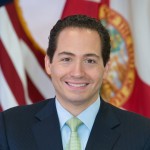 competing malls (who, in a funny twist, hired Gimenez pal and fundraiser Alex Heckler as their lobbyist). But Ladra has talked to residents in Miami Lakes and Palm Springs North, as well as environmentalists, who are concerned about the impact. Some business leaders have also quietly questioned the wisdom of such a huge megamall development at a time when retail sales are suffering nationwide (which may be why the New Jersey version of the American Dream is not yet awake).
competing malls (who, in a funny twist, hired Gimenez pal and fundraiser Alex Heckler as their lobbyist). But Ladra has talked to residents in Miami Lakes and Palm Springs North, as well as environmentalists, who are concerned about the impact. Some business leaders have also quietly questioned the wisdom of such a huge megamall development at a time when retail sales are suffering nationwide (which may be why the New Jersey version of the American Dream is not yet awake).
That brings us back to the taxing district thing, which could possibly offset the losses of a down retail market. While it’s supposedly too early to talk about tax breaks, Diaz de la Portilla said he would be willing Wednesday to talk about anything that commissioners ask him about it. So commissioners better ask him about it! Ladra is talking to every single one of you. We are all watching.
Read related story: American Dream lobby team = casino connections
Although, really, Ladra doesn’t know how much we can believe what the developer and/or their mouthpiece says. The American Dream application says the project, once complete, will attract 40 million visitors a year. That’s more than twice as many as the 19.3 million people who visit Disney’s Magic Kingdom annually. So you’re really telling us there’s going to be more visitors here than at Disney World? Really? Does a ski slope in South Florida have that much pu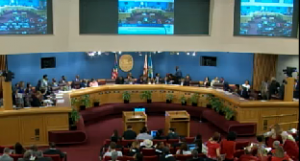 ll?
ll?
If that is the case, then the transportation plan better be freaking magical.
There’s also an application at Wednesday’s meeting for a zoning amendment to the land development map for a mixed-use project on a neighboring site by the Graham Companies. This project has a proposed 3-million-square-foot business park with retail, offices, industrial space and hotels, as well as 2,000 apartment.
And that, alone, is expected to generate more than 10,000 new trips by 2020.
read more


